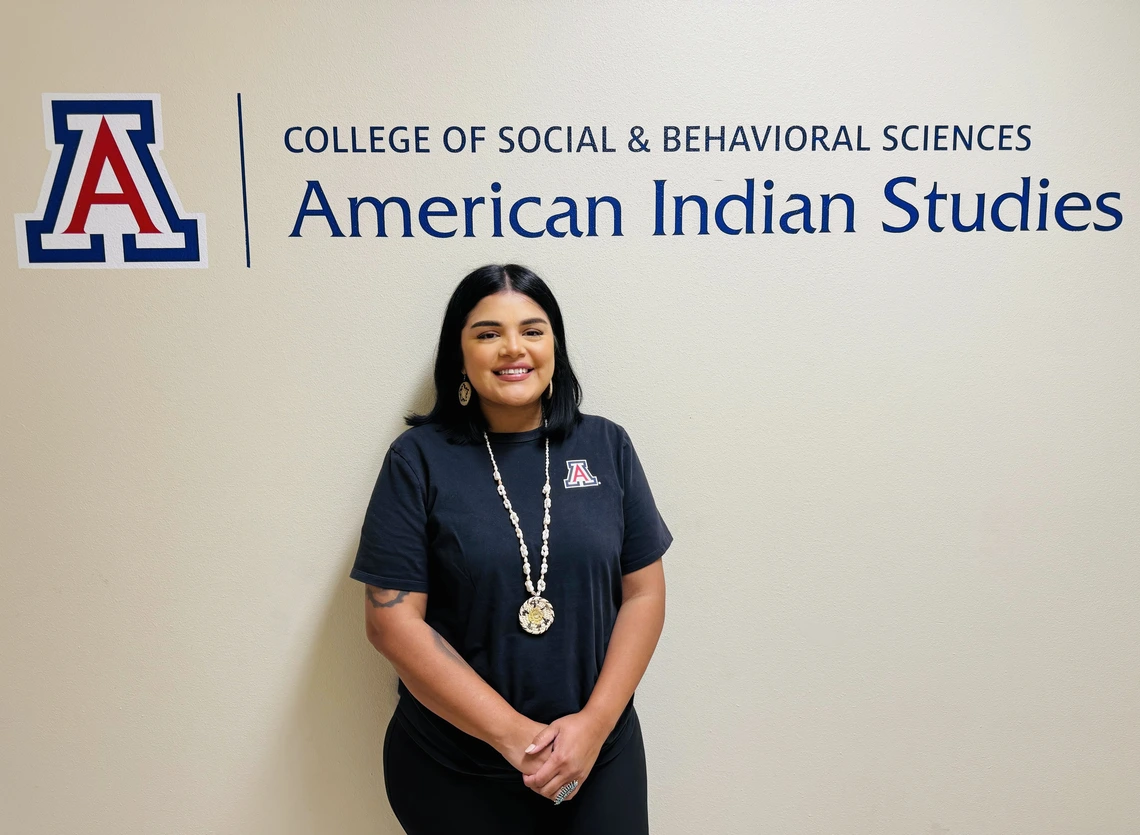Honoring Heritage, Inspiring the Future: A Conversation with Sarah McCovey

As the University of Arizona honors Native American Heritage Month, we spotlight students who embody leadership, cultural pride, and a commitment to community. Sarah McCovey, a junior majoring in American Indian Studies with a minor in psychology, serves as an ambassador for both the College of Social and Behavioral Sciences and the American Indian Studies program. Through her studies and outreach, Sarah is passionate about celebrating Indigenous knowledge, uplifting Native voices, and sharing what she’s learned to inspire the next generation. In this Q&A, Sarah talks about her journey, her heritage, and how she hopes to make a lasting impact both on campus and in her community.
To start, can you share which Nation you’re a member of and how your heritage has shaped your journey at the University of Arizona?
Hello, my name is Sarah McCovey, and I am a member of the San Xavier District of the Tohono O’odham Nation. My cultural identity has shaped my journey at the University of Arizona in so many ways—it’s been both my foundation and my motivation. Growing up O’odham taught me the importance of community, respect, and perseverance. These values continue to guide me through my educational journey. Being at the University of Arizona, I carry O’odham stories, language, and traditions with me, which give me a sense of purpose beyond myself. I’m not just earning a degree — I am paving the way for future generations from my community to see that higher education is possible while staying true to who we are as O’odham.
What drew you to major in American Indian Studies and minor in psychology? How do these two fields complement each other in the way you hope to serve your community?
After graduating last year with my Associate of Arts in Tohono O’odham Studies from Tohono O’odham Community College, I wanted to expand my knowledge. I decided to major in American Indian Studies because I am passionate about learning more about Indigenous sovereignty, policy, and community development from an academic and cultural perspective. It is important to me to understand the history and current issues that impact Native Nations, including my own, the Tohono O’odham Nation. That way, I can be a part of making a positive difference.
You’ve taken on leadership roles as both an ambassador for Social and Behavioral Sciences and for American Indian Studies. What have these experiences taught you about representing your college and empowering other students?
Serving as an ambassador for both Social and Behavioral Sciences and American Indian Studies, these roles have given me the opportunity to share not only my academic experiences but also my cultural perspective as a Tohono O’odham student. I’ve learned that leadership is about creating space for others to feel seen and supported. Empowering other students, especially Native students, means reminding them that their voices matter and that their presence in higher education is powerful. Through these ambassador roles, I’ve been able to connect students with resources, celebrate their successes, and show that our Indigenous knowledge and identity are strengths that belong in every academic setting.
What’s something you wish more people understood about your tribal community or about Native identity more broadly?
My hope is that people understand Indigenous people are still here. We are not just a part of history — we are the people of this land, still living on it, caring for it, with the guidance and teachings of our ancestors.
Are there any family traditions, stories, or teachings that continue to inspire you and guide your path as you look toward giving back to your community?
One teaching that continues to guide me comes from my family and the O’odham elders — to always walk in balance and show respect for all living beings. My parents, grandparents, and the elders would remind us that everything we do affects not only ourselves but our people, the land, and the generations to come. Being involved in my community reminds me of who I am and where I come from. It keeps me grounded and reminds me why it’s important to give back to my community, to honor the ones who came before us by helping our people move forward.
##

